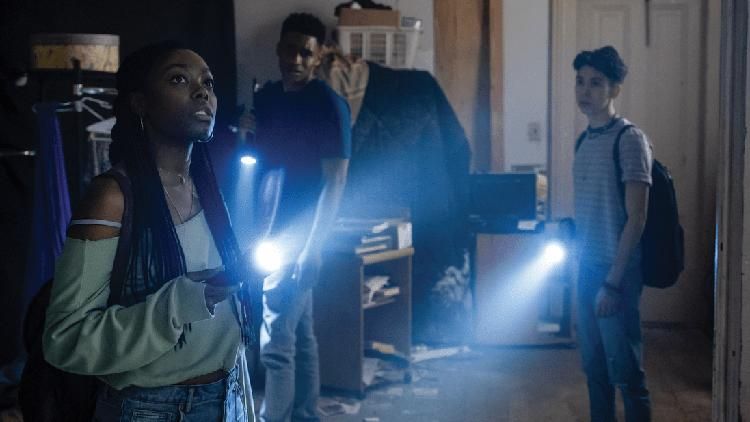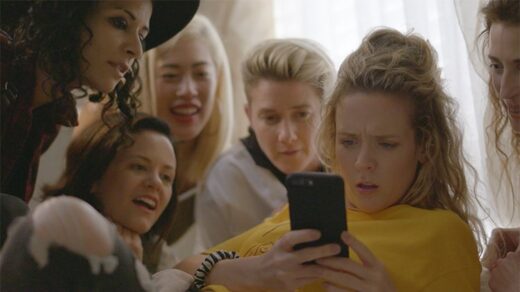‘Black as Night’ Is A Queer-Inclusive Vampire Film With Critical Bite
Author: Rachel Shatto

When you summon up the image of a teenage vampire slayer, there’s a good chance the mental picture is a familiar one: blonde, bubbly, and white. But that vision is about to change with Black as Night, which drops on Amazon Prime today and introduces audiences to Shawna (Asjha Cooper), a teen girl fresh out of those awkward years and about to take on a pack of centuries old-vampires. As she sums up her situation at the movie’s outset, “the summer I got breasts, that was the same summer I fought vampires.”
In the film, Shawna discovers a vampire’s plot to take over New Orleans by preying on the city’s most vulnerable inhabitants. When this leads to a tragedy close to home, she sets out for revenge with the help of her best friend Pedro by her side. The movie is equal parts coming of age tale and an exploration of centuries of racial inequality in America, and how these earliest events directly link to present circumstances. It’s a horror film with a very clear political point of view and heart. But at its core is Shawna, a new type of heroine for our current era.
It was the chance to break the paradigm of what a vampire fighting heroine looks like that inspired screenwriter Sherman Payne to write the film. “I was reacting directly towards sort of the most recent wave of vampire media that’s come out over the last 10 or 15 years. You know, I think about shows that I really love, like True Blood, Vampire Diaries, the Twilight series, and they all have a very specific type as their protagonists,” he says. “I wanted to write something that really honored my culture of Black people and Black women that I know where it’s a little more take charge, and I wanted to give them a little more of a hero cape.” Payne’s aim was to give young Black women that kind of protagonist in a genre that has largely left them unrepresented.
Black girls weren’t the only people that Payne took care to characterize as multilayered in his screenplay. Specifically, it was important to him that he write the character Pedro, Shawna’s best friend and vampire hunting compatriot, in a complex and human way in order to eschew the typical gay BFF tropes. “When I write gay characters…I want to make sure that I honor my gay friends, my LGBT friends, and reflect their full lives,” he explains. “They’re not just the sidekicks hanging on to the protagonist in the story and dealing with coming out, and that’s their only issue that they have in their lives.” It was this mindset that drove Payne to place such importance on Pedro having his own motivations and fully fleshed out background. For instance, the film sees Pedro struggling to decide between taking a scholarship at a prestigious school or staying where he is in order to care for his family. Sure he’s gay, and a best friend, but he’s also so much more.
It was the complexity of Pedro’s character that actor Fabrizio Guido connected with when he first read for the role. “I connected with Pedro’s loyalty towards his friends,” Guido says. “I admire Pedro so much. During a vampire apocalypse… Pedro’s the person I would want to be with.” Becoming that character proved to be an eye opening and empathy building experience for Guido, who recalled an instance during shooting when he hopped in a cab and was asked by the driver if he had a girlfriend. “I don’t blame him or anything, but it’s so quick for people to just assume there’s one way to live and I go ‘wow, I can see that being very, very tiring’,” he recalls. “That was very eye opening for me. Every character [I play] changes me and opens me up.”
While Guido considers his work on the film a way to better empathize with others, director Maritte Lee Go was drawn to Black as Night because it offered her an opportunity to tell a story about a young woman who was experiencing some of the same struggles she faced as a child. One of the recurring themes throughout the film is the role colorism plays within the Black community, which is something Go says she can identify with from her own upbringing. “I’m Filipino and we’ve got the same type of issues within my own culture. Growing up, my elders would say ‘stay out of the sun, you don’t want to look dark, it’s ugly.’ And that always got stuck in my head,” she recounts. “I was like, why are we telling our children that your skin is unacceptable? That should never be that way.” When she read Black as Night’s screenplay, Go saw an opportunity to help redefine beauty “through our voices, through perspective, through empathy, and jumping into the perspective of this young woman who feels like she’s not beautiful.” But how? “We got to completely flip it on its head and say that Black is beautiful, you are beautiful just the way you are, and that’s your inner strength, that’s your confidence. That is beauty,” says Go.
This is a message that definitely resonates with Cooper, the film’s lead, who feared there wasn’t room in Hollywood for actors who looked like her. “You always see a variety of the same type of Black women portrayed, and it’s just like a lighter skinned girl with curly hair. And I’m just like, there’s a variety of what we look like that’s not portrayed,” she explains. Still, Cooper’s happy to see things are changing and is excited to be a part of it. “It’s actually pretty emotional for me, because this is what I prayed for… I never really knew if I would be able to work consistently because of how I look, but the industry has definitely changed,” she says. “If you just stick to it, and you’re persistent, the industry will catch up. And now the industry is way more open to true diversity and inclusion.”
Black as Night marked Go’s feature directorial debut, but it was a dream project for the lifelong horror fan. It was also something she one once wondered if she’d ever have the opportunity to work on, as women directors have historically faced difficulty making space in the movie industry, even in the horror genre.
It’s an inequity that’s beginning to shift, thankfully, but it was only as far back as 2018 that Blumhouse Productions founder Jason Blum gave an interview to Polygon in which he said, “There are not a lot of female directors period, and even less who are inclined to do horror.” This was met with a backlash at the time from women directors who were already working in the genre but struggling to find the kind of funding and opportunities that Blumhouse was in a position to grant.
Go recalls when that story first hit and how it impacted her. “I remember being like wow,” she says, explaining that it reminded her of a time when she was at the Blumhouse office a few years earlier. “I remember sitting in the waiting area in the lobby. And it was so powerful, because I’m such a huge horror fan,” she remembers. “And they have pictures of all the directors all over the walls, and they’re all white males, except for like James Wan. I remember looking at all of them, and I’m like, ‘Oh my god, this is so incredible. I want to be like them. But I see nobody who looks like me, how the hell am I gonna ever do this?’ And I remember reading that article being like, ‘Yeah, I wonder what he’s gonna do about that?’”
The good news is that it seems like the message was received, because three out of the four films in this season of Welcome to the Blumhouse — Black as Night, Bingo Hell, and The Manor are all woman-directed. “They heard it, he heard it,” Go affirms, which opened the door for this film to be made. “And that’s the exciting thing about Black as Night,” Go adds. “It takes the story of vampires that we’ve heard a million times in lots of different ways, but never like this, and never through this perspective.”
Black as Night is available to watch now on Amazon Prime.
Also heading to Prime today is Bingo Hell, directed by Gigi Saul Guerrero, which focuses on a group of senior citizens who fight back when a sinister businessman rolls into town and takes over their beloved bingo hall.
The final two Welcome to the Blumhouse films hit Amazon Prime on October 8. The Manor, directed by Axelle Carolyn, is about an older woman who checks into an assisted living facility, only to discover that its residents are being stalked at night by a horrifying creature.
Madres, directed by Ryan Zaragoza, follows a Mexican couple after their move to a migrant community in California during the 1970s. Pregnant with their first child, the mother begins suffering strange symptoms and visions that may be tied to a talisman discovered by the couple.
Original Article on The Advocate
Author: Rachel Shatto




